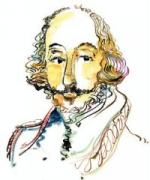|
This section contains 2,715 words (approx. 10 pages at 300 words per page) |

|
SOURCE: “Myth and Naturalism: Merchant to Macbeth,” in Shakespeare: Pattern of Excelling Nature, edited by David Bevington and Jay L. Halio, Associated University Presses, 1978, pp. 136-42.
In the following essay, Brooke analyzes the juxtaposition of naturalism and myth in All's Well That Ends Well, Macbeth, and several other Shakespearean dramas.
It seems that it is myth and archetype that have replaced religion for the twentieth century, not poetry. Poems and plays are often regarded as little more than media for the transmission of myth; and myth is therefore thought of as more permanent than the forms in which it is transmitted. So the problems of art are sometimes seen as the adjusting of universal myths to contemporary realities. I doubt that; I believe rather that the interaction of myth and realism is mutually modifying, producing a mythology as contemporary, and therefore as temporary, as the realism. But that...
|
This section contains 2,715 words (approx. 10 pages at 300 words per page) |

|


